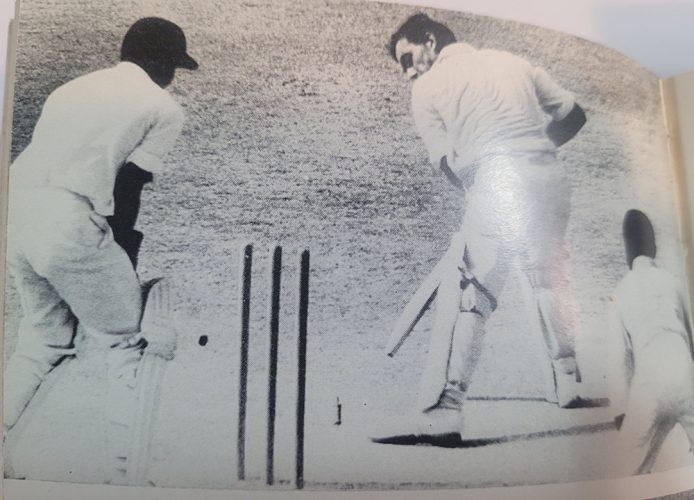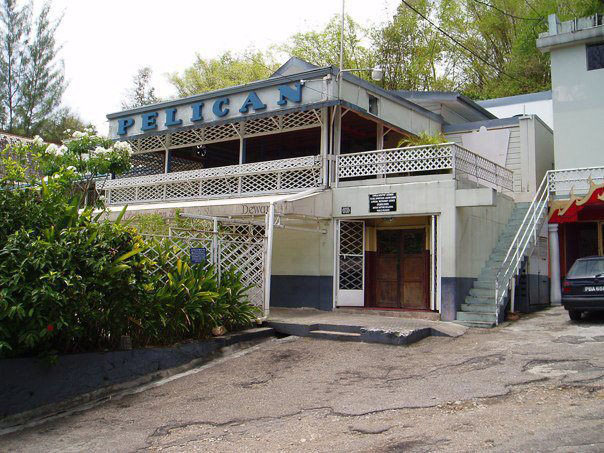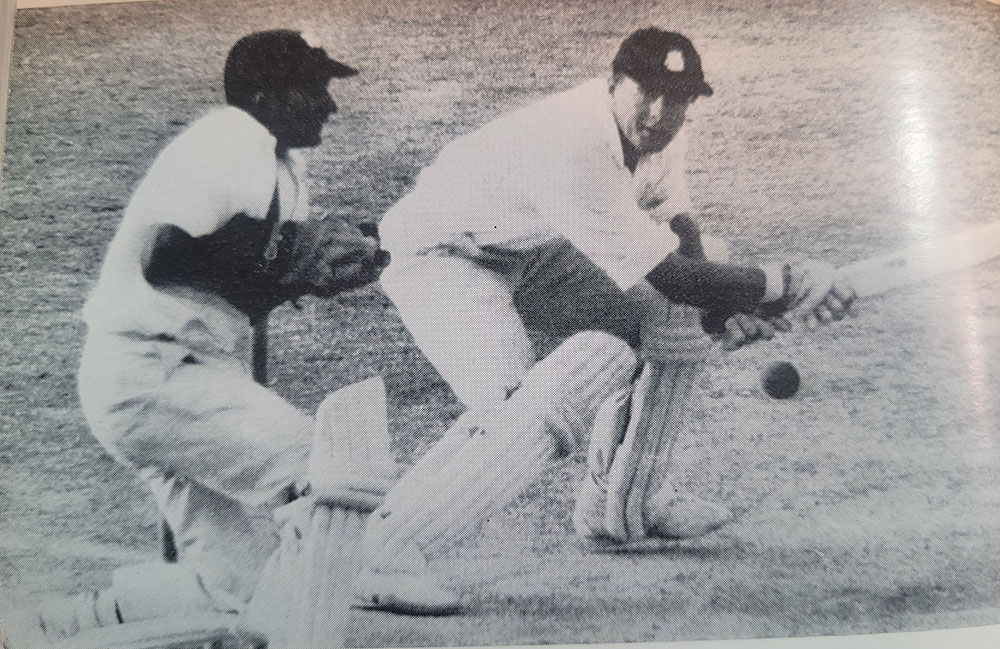In this week’s edition of In Search of West Indies Cricket Roger Seymour examines the controversy surrounding the infamous declaration by Sobers in a Test match in Trinidad in 1968, and poses the question, did Sobers really declare?
It was past midnight, early Wednesday, 20th March, 1968 – the typical English pub scene. Most of the patrons – British, of course – in the packed establishment had a little too much to drink but no one was leaving. Everyone was singing. Laughter echoed around the pub. Beer and champagne were par for the course. Pub fare was everywhere: Shepherd’s Pies, Bangers and Mash, Fish and Chips. The bartender was constantly ringing the bell. It’s a bit of a duck story, really. The Pelican Pub, though English, is in the Caribbean and home to a rugby side — the Caribs.
The tale begins in England, at London’s Heathrow Airport, at 11.45 am on Wednesday, 27th December, 1967, with 16 English cricketers, led by Captain Colin Cowdrey and Manager Les Ames, heading to the West Indies. Eight hours later, the BOAC (British Overseas Airways Corporation) flight arrived at Seawell Airport, Barbados. As the players descended the stairs, they were greeted with the sounds of the Speedbird Steelband.

The unofficial World Cricket Championship had commenced as far as the cricket aficionados of both teams were concerned. The West Indies were undefeated since 1962, with series victories over India (twice, both at home and away), England (twice, both away) and Australia. In the previous three years, England had drawn with Australia, split two series with South Africa, lost to the West Indies, and beaten New Zealand, India and Pakistan. However, cracks were beginning to appear in the great West Indies side of the 60s. The reliable opener Conrad Hunte had retired after 44 Tests. The London bookmakers had quoted the hosts at 3:1 to retain the Wisden Trophy. With Garry Sobers in the lineup, anything was deemed possible.
Those were the days of three-month tours, five Test matches and first class matches against the ‘big four’ – Jamaica, Barbados, Trinidad and Guyana – the Leeward Islands, the Windward Islands and the President’s XI. The latter match, often scheduled very early on the tour itinerary, provided an insight to who was on the Selection Committee’s radar for Test selection.
Tour matches
Three days after their arrival, the MCC (in those days England toured under the banner of the Marylebone Cricket Club) played a two-day match against the Barbados Colts. Scores: MCC 199 for six declared; A Knott, 69, F Titmus, 63*, and 63 for five. Barbados Colts 290 for four declared, Geoffrey Greenidge, 116*.
President’s XI vs MCC, at Kensington Oval, January, 3rd – 6th. Scores: President’s XI, 435 for nine declared; C Davis, 158*, S Camacho, 85, D Murray, 63, K Barrington, five for 99, & 116 for one, R Fredericks, 64*. MCC, 365; C Cowdrey, 139, G Boycott, 135, M Foster, four for 59, & 94 for two, K Barrington, 53*. Match drawn.
Trinidad vs MCC, at Queen’s Park Oval, January, 9th – 12th.. Scores: Trinidad, 321; R de Souza, 86, C Davis, 68, & 204 for three declared, M Carew, 90*, C Davis, 90*. MCC, 207; W Rodriguez, six for 51, & 188 for six, J Edrich, 67. Match drawn.
Trinidad Colts vs MCC, at Pointe-a-Pierre, January, 15th – 16th. Scores: MCC 440 for six declared; C Milburn, 139, J Parks, 67. Trinidad Colts, 121; R Hobbs, six for 59, & 119 for four. Match drawn.
First Test, at Queen’s Park Oval, January, 19th, 20th, 22nd, 23rd, 24th. Scores: England, 568; K Barrington, 143, T Graveney, 118, C Cowdrey, 72, G Boycott, 68. C Griffith, five for 69. West Indies, 363; C Lloyd, 118, R Kanhai, 85, & 243 for eight, B Butcher, 52. Match drawn. Sobers and Wes Hall defended resolutely throughout the final session, which commenced with the hosts on 180 for eight, staring at an innings defeat.
Jamaica Colts vs MCC, at Montego Bay, January, 27th, 29th. Scores: MCC, 116; W Taylor, five for 34, & 71 for one, J Edrich, 53*. Jamaica Colts, 216; L Dyer, 64, R Hobbs, seven for 97.
Jamaica vs MCC, at Sabina Park, January, 31st, February, 1st, 2nd, 3rd. Scores: MCC, 135; B Wellington, six for 23, & 343 for six declared, C Cowdrey, 107, J Edrich, 98, B D’Oliveira, 68*. Jamaica, 98; J Snow, five for 36, & 206. MCC won by 174 runs.

Second Test, at Sabina Park, February, 8th, 9th, 10th, 12th, 13th . Scores: England, 376; C Cowdrey, 101, J Edrich, 96, K Barrington, 63, & 68 for eight. West Indies, 143; J Snow, seven for 49, & 391 for nine declared, G Sobers, 113*, S Nurse, 73. Match drawn. England managed to stave off the spin of Sobers and Gibbs to avoid defeat, after the West Indies followed on 233 behind.
Leeward Islands vs MCC, at Antigua Recreation Ground, February, 15th, 16th, 17th. Scores: Leewards, 144, & 323 for eight declared; L Sergeant, 127, E Gilbert, 58*. MCC, 362 for four declared; G Boycott, 165, K Barrington, 100*, A Knott, 57, & 8 for no wicket. Match drawn.
Barbados vs MCC, at Kensington Oval, February, 22nd, 23rd, 24th, 26th. Scores: MCC, 578 for five declared; G Boycott, 243, J Edrich, 73, K Barrington, 69*, C Milburn, 68, B D’Oliveira, 66. Barbados, 276; S Nurse, 144, P Pocock, five for 84, & 161 for five, M Bynoe, 64*, G Sobers, 56. Match drawn.
Third Test, at Kensington Oval, February, 29th, March, 1st, 2nd, 4th, 5th. Scores: West Indies, 349; B Butcher, 86, G Sobers, 68, S Camacho, 57, J Snow five for 86, & 284 for six, C Lloyd, 113*, B Butcher, 60. England, 449; J Edrich, 146, G Boycott, 90, T Graveney, 55, B D’Oliveira, 51. Lloyd’s second century of the series foiled any chances of an England victory.
Windward Islands vs MCC, at Castries, St. Lucia, March, 8th, 9th 11th. MCC, 215, & 34 for three. Windwards, 165, I. Shillingford, 69.
The series then returned to the Queen’s Park Oval for the Fourth Test. (Prior to the Antigua Recreation Ground acquiring Test match status in 1981, the Queen’s Park Oval hosted two Tests in five Test series). Both teams made two changes to their Third Test sides. England’s first choice wicket-keeper Jim Parks was nursing a badly bruised right index finger and was replaced by Alan Knott, who then became a fixture behind the stumps until the end of the 1977 summer when he joined Kerry Packer’s World Series Cricket Tour. Tony Lock, who had been flown out from Australia as the replacement for vice-captain Fred Titmus (who had lost four toes on his left foot in a boating accident in Barbados), came in for Pat Pocock.
After appearing in 44 consecutive Test matches, Wes Hall was dropped from the West Indies team, having taken only seven wickets in the three Tests to date. David Holford, who had captured only four wickets, also received the axe. The Barbadians were replaced by Trinidadians, Michael ‘Joey’ Carew and Willie Rodriguez, the leg spinner. In some quarters, it was felt that the selectors were bowing to pressure from the Trinidadians who threatened a boycott of the Test unless they received a greater share of representative honours. Deryck Murray, the wicket-keeper, had been the lone Trinidadian in the team for the entire series. The changes allowed Seymour Nurse, who opened the innings in the First and Third Test matches, to drop down to three/four in the batting order, his preferred position, and Carew and Steve Camacho to face the new ball.
Fourth Test
First Day, Thursday, 14th March. Sobers won the toss and elected to bat. At lunch, the hosts had raced to 102 without loss from 30 overs, before the rains intervened. At the close of play, the West Indies were nicely poised at 168 for two. The opening partnership was 119 before Carew departed for 36 off a mistimed hook. Camacho lit up the Oval with a scintillating display, striking 11 boundaries, before being dismissed for 87, in similar fashion to Carew. Former Australian all-rounder, Keith Miller described Camacho’s knock as containing, “the widest range of classic shots seen so far in this series”.
The 14,000 in attendance on the second day witnessed an exhibition of stroke play of the highest order, as the home side piled on the pressure, scoring 311 runs in 295 minutes. Kanhai, 153, and Nurse, 138, thrashed the English attack mercilessly in a devastating partnership of 273, on the virtually lifeless pitch. Kanhai, the more aggressive partner, hammered 19 fours and one six, as the hosts finished the day in the commanding position of 479 for four.
On Saturday, after adding 58 in 42 minutes, with Lloyd, 43, Sobers, 48, declared at 526, with seven wickets down. On the easy-paced track, England crawled to 204 for two at the close of play, with Cowdrey, 61* and Barrington, 28*. Earlier, the opening pair of Boycott, 62, and Edrich, 32, had feasted on the exclusive diet of spin offered by the homeside, following the departure of Charlie Griffith due to a pulled leg muscle. The other area of concern was Rodriguez’s lack of form. He delivered several no balls and full tosses.
When play resumed on Monday, after Sunday’s rest day, England slumped from 245 for two, to 260 for five, as Lance Gibbs trapped the well set Barrington, 48, LBW, and Rodriguez dismissed Graveney and D’Oliveira in successive balls. Knott joined his captain and Kent teammate, Cowdrey, prevented the hat trick, and as he was to do throughout the rest of his long career, frustrated the opposition. The pair added runs at an alarming rate, the 50 partnership arrived in 40 minutes, and the 100 in 85. The partnership had added 113, when Sobers, in total desperation, tossed the ball to Butcher, the eighth potential bowler in the lineup. Butcher, who delivered googlies and leg-breaks, had previously played in the Fifth Test versus India at Delhi in 1959.
Butcher produced one of the most amazing spells of bowling by a part-timer. His ball encouraged Cowdrey, 148, to give a chance to wicket-keeper Murray, who gleefully took it. In his second over, fast bowlers, Snow and David Brown, were both dismissed for ducks, with Lock following the next over for three, via the LBW route. England, 381 for nine. Knott then took charge, as the pair added 33 vital runs, before Butcher completed the rout of the England tail, clean bowling Jeff Jones. Butcher, with astonishing returns of 14 – 4 – 35 – 5, led the team off.
After two overs, Carew’s appeal for light was upheld, and play was called off for the day. In all, three and a half hours had been lost to rain and bad light. J S Barker, a Yorkshireman based in the West Indies, who covered cricket for regional newspapers, stated in his daily match report, “It seems extremely unlikely any decision can be reached but I am tempted to say, in an island where oysters grow on trees …”
Sobers declares
At 2:15 pm, 35 minutes after lunch, on Tuesday, 19th March, Sobers suddenly got up and clapped his hands, signalling his intention to declare his side’s innings closed. The West Indies, who had displayed no urgency to score whilst batting were 92 for two, with Carew, 40, and Kanhai, 2, the not-out batsmen. In the first session, England had bowled 22 overs of pace to a defensive field as they went through the motions.
The declaration came as a complete surprise to everyone. There was no threat on the easy-paced track, and the West Indies, already on the thin side, had been further depleted with Griffith’s absence since leaving the field on Saturday. Sobers had set England a victory target of 215 runs in 165 minutes, an asking rate of 78 per hour, well beyond their scoring rate in the series. The West Indies would need to take a wicket every six to seven hours to win the match. This was Sobers’ 17th Test as captain, and he had declared on three previous occasions, winning once and drawing twice. This was the first time he had declared twice in a match. Only one other West Indies captain had performed a similar feat before, G C ‘Jackie’ Grant, who did it twice, winning one and losing the other.
Had England, who never looked like winning this Test, been handed a gift on a platter? Or was it a Trojan horse? Did Sobers think England would crumble to spin like they had done in the second innings of the Jamaica Test? Could Rodriguez perform a miracle? Could Butcher repeat his first innings heroics? Had Sobers overlooked the fact that the English batsmen had perfected the art of chasing totals against the clock in County Championship matches and the one day Gillette Cup Tournament (which had been introduced in 1963)?
During the 1994 England Tour of the Caribbean, on 20th February, during a rain delay on the second day of the First Test in Jamaica, Cowdrey reminisced on the declaration with another former England captain Bob Willis, on the telecast. “It was a crafty declaration. We had been in the field for a long time and we were a bit tired. In the first innings, we had trouble picking out the leg-breaks and googlies of Rodriguez and Butcher, who was bowling from the pavilion end where there was no sightscreen. We needed Edrich and Boycott to give a perfect start. Then I joined Boycott…”
In a throwback to the early 1900s, the West Indies opened with the combination of Sobers’ pace and Gibbs’ spin. With the score on 12, Edrich was badly missed by Murray off Sobers. After 40 minutes, Rodriguez was introduced, striking immediately, bowling Edrich for 29. England 55 for one. At tea, England were 73 for one off 27 overs in 75 minutes, behind the clock. There was talk in the England dressing room of playing out for the draw, led by the circumspect Cowdrey, but the general feeling was to go for it, later recounts indicated.
After tea, the match swung sharply in England’s favour. The first half hour produced 58 runs from ten overs, as Cowdrey raced to 50 in 55 minutes. When the final hour began, England required 85. The English pair stole singles and punched boundaries off the docile pitch. Carew, who had delivered 15 maiden overs in the first innings, saw his first three deliveries dispatched to the boundary. With 45 minutes remaining, England needed 65.
When Cowdrey was caught by Sobers off Gibbs for 71, made in 76 minutes, England were 173 for two, well on pace to victory. With 42 needed in 35 minutes, Boycott took charge. Despite the hiccup of losing Graveney, Boycott, 80*, and D’Oliveira, 12*, saw England home with three minutes to spare. Boycott, labelled a slow scorer, had timed the run chase to perfection. Once again the Trinidadian mystery spinners had failed to deliver the goods at home.
The West Indian public and press were furious. Sobers was blamed entirely for the loss. At the press conference, the captain explained, “I thought to myself this is a game of cricket we are playing and if every game is drawn what is the sense of playing it?”
Aftermath
An effigy of Sobers was hanged that night in Port-of-Spain’s Independence Square. The newspapers’ headlines the next day screamed, “Sobers declares WI out of 4th Test.” His penchant for horses no doubt contributed to the legend that he gambled away the Test. In some quarters it had been hinted that Sobers had been needled into the very risky proposition, or perhaps coerced by members of the WI hierarchy whom he shielded. Whatever the reason behind the decision, it is remembered as one of the great blunders of all time in the history of Test cricket.
The Fifth Test at Bourda in Georgetown was drawn with the English last pair at the wicket, as England took the series 1 – 0. It was the beginning of the end for the wonderful side of the 1960s.
On the other side of Queen’s Park Savannah, at the Pelican Pub in Cascade, the home of the Caribs Rugby Club, where the ceiling was plastered with foreign licence plates, the draught beer flowed and the celebrations of the England team, the English holidaymakers and the expats working in Trinidad, continued long into the night.





